If you’re a fan of iguanas I’m sure you know that they come in many different colors. They can be green, blue, or even red. But did you know that albino iguanas also exist?
Many people are unaware that iguanas can be albino, but it’s very possible. It is quite rare though, so if you’ve never seen one, you’re not alone.
In this guide, I’m going to go over everything you need to know about albino iguanas. I will discuss how they develop this condition, why they’re usually yellow rather than white, how much they cost, and much more. Let’s get started!
What is an albino iguana?

Let’s start with the basics and discuss what an albino iguana is exactly. In essence, an albino iguana is not that different from a regular green iguana. They are both part of the same family. The main differences are in the coloring of the skin and the eyes.
Albino iguanas have yellowish or pale scales, giving them a unique, distinct look that sets them apart from the regular green iguana. The eyes are another way to determine whether an iguana has albinism. If an iguana is an albino, its eyes will be a red or orange color.
What causes this mutation?
The reason why they have this pale color and different colored eyes is that there’s a defect in one or several genes that distribute or produce melanin. Melanin is responsible for the pigmentation of the skin and eyes.
As a result of this defect, no melanin or pigment is produced which manifests itself in the lack of color in the scales and eyes.
The gene responsible for this condition is recessive. This means that both parents must carry this gene for it to show in their offspring.
To learn more about it I highly recommend you read the Wikipedia page on albinism. It’s quite a complicated mutation to completely understand.
Why are they yellow or red instead of white?

When most people think of albino they think of an animal with a pale white color with red eyes. However, when you look up iguanas with this condition they usually appear to be a pale yellow or red color rather than white. Why is that? The primary reason for this is that most iguanas that are labeled as “albino” actually have amelanism instead.
There’s not a huge difference between these two conditions. The main difference is this: amelanism affects only one pigment (for instance the red pigment) while albinism means that the animal produces no pigment at all. As a result, iguanas with amelanism still produce their yellow or red color, but no other colors. Iguanas with albinism produce no pigment at all and are therefore completely white.
Breeders usually do not make a distinction between amelanism and albinism and sell iguanas with amelanism as albino. For the purpose of this article, I will not make the distinction either and refer to both as albino. However, I did think it was important to explain the difference since they’re not completely the same.
Are albinos more expensive?
Since albino iguanas are quite rare, they’re usually more expensive when bought from a breeder.
Just like many things in life, the laws of supply and demand determine the price of iguanas. Albinos are quite rare and in pretty high demand because they really stand out and look different from regular iguanas. Their unique coloration makes them very desired among pet owners and many of them are willing to pay huge sums to get their hands on one of these rare creatures.
Usually, you’ll have to pay upwards of $700 to buy an albino iguana. Compared to a regular green iguana this is a huge increase, they cost more than 15 times as much!
Where can you buy albino iguanas?
Several iguana breeders have webshops where you can buy them such as this one. Usually, they sell them as babies.
However, since these creatures are so rare, it’s very common for them to be out of stock. If that’s the case, you can try a different breeder or try your luck on craigslist. On websites like that, you’re more likely to find fully grown albino iguanas rather than babies. Still, success is not guaranteed and you can spend quite some time finding someone to sell you an iguana with albinism.
If you’re trying to breed them, you should make sure that both of the parents carry this gene otherwise it’s impossible for their babies to have the condition.
Names for albino iguanas
If you do manage to get your hands on one of these rare animals, you’ll naturally want to give him a cool name. Here are some suggestions:
- Avalanche
- Cloud
- Blizzard
- Snow
- Frosty
- Icy
- Pale Dragon
- Subzero
- Tundra
- Winter
- Yeti
Why is my iguana turning white?
Your iguana might turn white or a dullish color several weeks before he’s about to shed. This is normal, and nothing to worry about. You will notice that your iguana will not shed all its skin at once. Rather, it will develop white spots on its body where the skin becomes looser right before it sheds.
Also, this does not mean that your iguana is turning into an albino. Albinism is genetic and a non-albino can’t turn into one. Your iguana will retain the same color after shedding.
It’s also possible that your iguana is becoming lighter in color because you keep it in too warm of an environment. Temperature can influence their color, in cooler temperatures, they become darker, while in warmer temperatures they become lighter. The reason for this is that a darker color allows them to retain heat better and vice versa.
Albino iguana care
Some people think that albinos require special care, but this is not the case. Caring for an albino iguana is exactly the same as caring for a regular green iguana. They’re the same size as babies, as well as fully grown, and require the same foods as their green counterparts.
For this reason, in order to prepare for adopting an albino iguana, I highly recommend that your read general information about iguanas. Good things to familiarize yourself with are whether iguanas are dangerous (they can bite) and general information about owning a pet iguana. By doing so, you can prepare yourself for the challenges that come along with raising one of these lizards.
- How Long Do American Eskimo Dogs Live? Important Factors and Care Tips - September 29, 2023
- Do American Bulldogs Need Grooming? Essential Tips and Care Guidelines - September 29, 2023
- Do Bengal Cats Enjoy Playing? Essential Tips for Keeping Them Active - September 29, 2023